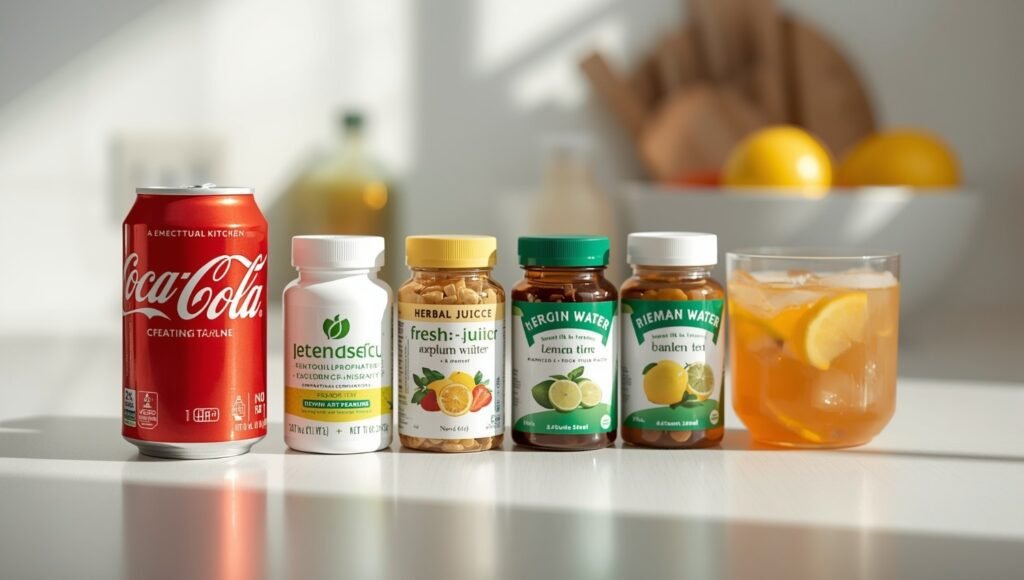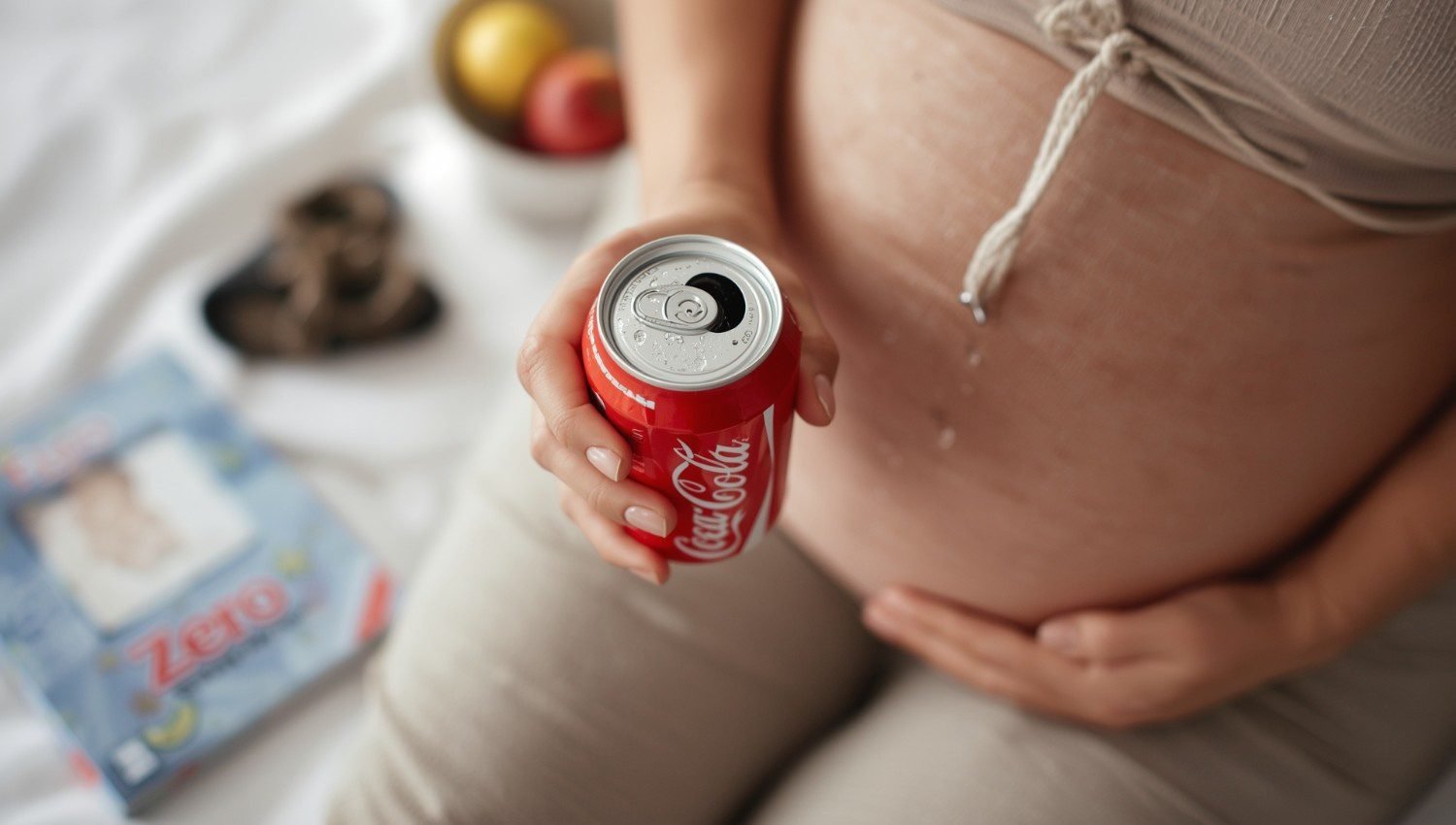In This Article, You’ll Learn:
• Coca-Cola During Pregnancy — Should You Give In or Avoid It?
Find out whether it’s safe to drink Coca-Cola while pregnant, and what experts say about occasional cravings versus daily consumption.
• Coca-Cola and Caffeine During Pregnancy — How Much Is Too Much?
Understand the caffeine levels in Coca-Cola, their effects on you and your baby, and safe intake limits during each trimester.
• Does Cola Help With Nausea During Pregnancy?
Discover why some moms-to-be reach for cola to ease morning sickness — and what healthier, doctor-approved alternatives exist.
• Cola for Heartburn During Pregnancy — Relief or Risk?
Learn whether cola drinks worsen acid reflux, burning sensations, and sour taste, plus what safe remedies you can try instead.
• Coke Zero or Classic Coca-Cola — Which Is Safer During Pregnancy?
Compare sugar-free Coke Zero and regular Coca-Cola to see which is a better option for pregnant women, based on caffeine, sweeteners, and sugar content.
• Join Our Parenting Community!
Connect with other parents, share real experiences about pregnancy nutrition and cravings, and get expert-backed support every step of the way.
A Single Sip of Comfort or Overlooked Risk?

When pregnant women reach for a single can of Coca-Cola during pregnancy, it often feels like a sweet relief — a harmless indulgence that brings a refreshing chill and that intense fizz many parents recall fondly from before pregnancy. I remember craving that same sparkle, thinking one couldn’t possibly hurt. Yet, medical experts remind us that Coca-Cola contains caffeine milligrams ranging between 32–42 mg per can, and that caffeine intake from all beverages should stay within no more than 200 mg daily. Other soft drinks show varying levels, but similarly, they’re generally not recommended in excess.
From internet forums to healthcare recommendations, there’s a shared sense of respect for the unique journey of pregnancy — where balance and clarity matter most. Some parents say it helps curb nausea, while others warn about hidden sugars that tempt and form a habit. The overlooked risk lies in assuming that approximately one serving won’t affect your baby, when scientific rigor and optimum health suggest otherwise. My own shift came after advice from friends and reading that a single sip can quickly count toward that daily limit. It’s not about denial but awareness — learning when to pause, wonder, and choose what truly supports yourself and your child’s well-being.
Is it Safe to Drink Coca-Cola During Pregnancy?
Many pregnant women often wonder if sipping Coca-Cola or other soft drinks could have adverse effects on fetal health. While carbonated beverages are popular for their taste and caffeine, nutritionists and medical studies point out the need to restrict intake for the safety of both mother and fetus. The sugar and caffeine in Coca-Cola can influence fetal development, and evidence even links high intake with risks like premature birth. Some mothers on forums mention using Coke Zero or caffeine-free options to ease nausea or heartburn, but health experts recommend relying instead on nutrient-rich choices like water, juices, or smoothies that support hydration, amniotic fluid, and essential vitamins and minerals.
Having spoken to nutritionists and reviewed studies, I’ve seen how even a small change in dietary habits can impact fetal development. Coca-Cola, chocolate, and other sweetened beverages are generally not ideal during pregnancy or breastfeeding. The nutritional information on these supermarket drinks might seem harmless, but real scientific evidence shows that mindful moderation helps sustain both comfort and health.

How Much Coca-Cola Is Safe to Consume During Pregnancy?
According to healthcare professionals, there’s no exact “safe” amount of Coca-Cola to consume during pregnancy, but most guidelines emphasize minimizing caffeine and sugar intake. Doctors, researchers, and obstetricians warn that excessive soft drinks can lead to negative effects such as gestational diabetes, obesity, and abnormalities in fetuses. The calories, artificial sweeteners, and aspartame in regular or diet variants can interfere with maternal and fetal health, impacting cardiovascular development, growth, and well-being.
From my own prenatal checkups, even small amounts of caffeine-containing products were reviewed carefully. Some maternity care packages, like those at Vinmec International General Hospital, include prenatal examinations, screenings, and interventions to detect early complications. Their medical services encourage mothers to choose nutritious beverages and nutrient-dense foods instead of Coca-Cola, supporting both baby and mother through healthy dietary habits. By focusing on hydration, balance, and lifestyle adjustments, expecting women can better protect their fetal development and overall health.
Coca-Cola During Pregnancy: Can You Be Tempted or Is It Better to Avoid It?
For women expecting a child, cola and other carbonated sweet drinks may look appetizing and heavily advertised as refreshing. However, consuming them regularly adds preservatives, dyes, and phosphates that bring no real nutrients to your diet. The Coke sugar raises the glycemic index, spiking blood levels quickly and making you crave more. As someone who once reached for that sweet drink to ease tiredness, I learned that the short-term pleasure isn’t worth compromising long-term health for either mother or baby. A mindful shift toward healthy, balanced choices gives your body what it truly needs to thrive during this delicate phase.

Unpacking the Ingredients: What’s Inside That Familiar Can?
When we look closely at Coca-Cola and its ingredients during pregnancy, there’s more happening inside that familiar can than just flavor. The caffeine, similar to what’s in coffee, tea, or energy drinks, can cross the placenta and reach the fetus. Because the baby’s enzymes aren’t developed enough to process and eliminate it, research links excess exposure to risks such as miscarriage, low birth weight, and preterm delivery. For maternal well-being, experts suggest staying within safe moderation and avoiding reaching the upper caffeine threshold that can disrupt metabolism and affect fetal development.
Beyond caffeine, sugar plays another role. Each can carries enough glucose to strain the body’s regulation systems, contributing to diabetes, hypertension, and weight gain that can lead to obesity during pregnancy. Even Zero and Diet versions use sweeteners like aspartame or sucralose, which are calorie-free but still under observation by the FDA, EFSA, and other agencies monitoring safety and consumption thresholds. Other additives—like phosphoric acid, caramel colorants, and carbonation—can interfere with calcium absorption and affect bones over time. While authorities confirm moderate use isn’t direct harm, consistent awareness ensures both mother and fetus stay supported through mindful choices and balanced diet habits.
Caffeine, Sugar, and Additives: How Much Is Too Much?
Many parents wonder just how safe Coca-Cola is during pregnancy, especially with its mix of caffeine, sugar, and soft drink additives. The key lies in portion and pattern—an occasional enjoyment isn’t the same as daily excess. Studies have shown that too much caffeine may increase the chances of miscarriage, fetal growth restriction, or preterm delivery due to hormonal changes in the mother’s bloodstream. The American Heart Association and other health organizations suggest that women watch their sugar consumption since excess beverages with added sugars are major contributors to gestational diabetes and metabolic stress.
Even with artificial sweeteners like aspartame, sucralose, or acesulfame-K, science still urges caution. Though labeled safe by diet and population data, their influence on the gut microbiota, metabolic programming, and insulin production in children isn’t fully clear. Checking labels, knowing sources, and keeping caffeine intake per day below recommended levels helps reduce risks. True health during pregnancy isn’t about strict avoidance—it’s about moderation and respect for how small choices affect long-term well-being.

Coca-Cola During Pregnancy and Caffeine
Scrolling through forums, I’ve noticed many mothers share their experiences balancing Coca-Cola consumption and caffeine during pregnancy. Some pregnant women say it helps with craving, others admit it’s hard to resist that fizzy comfort. Still, the reality is that a day filled with coffee, Coca-Cola, or other caffeinated drinks can quickly exceed limits and raise risks of miscarriage, hypertension, premature birth, or low baby weight. The safest choice remains mindful moderation and substituting with caffeine-free or naturally hydrating options whenever possible.
Expert advises
If a woman eats a healthy and balanced diet every day, she can afford to drink an occasional glass of Coca-Cola during pregnancy. However, if a pregnant woman suffers from, among others, diabetes, hypertension, overweight and obesity, she should definitely avoid drinking Coca-Cola during pregnancy.
Dietitian at the Diabetes Clinic, Institute of Mother and Child
Can tail actually help with nausea during pregnancy?
Why Some Women Turn to Cola During Pregnancy?
Across internet forums, many women share that cola drinks seem to ease nausea during pregnancy because of their refreshing taste and fizzy feel from carbon dioxide content. I remember that same craving for a cold Coke when nothing else seemed to stay down. Some say the bubbles soothe their stomach, while others simply enjoy the comfort of a familiar drink. Yet, gynecologists and doctors often remind expectant mothers to stay mindful of the composition—sugar, carbonated water, and additives can affect health and the fetus if taken in excess.
Healthier remedies or natural methods can offer the same relief without side effects. For example, a mild ginger infusion, a few drops of mint essential oil in warm water, or a handful of almonds provide gentle comfort and even extra nutrients. While cola might bring momentary ease, the best approach is to understand your body’s needs and use moderation under your doctor’s guidance. Every mother’s experience is unique, but keeping an eye on what truly supports well-being makes all the difference.
Burning in the Esophagus, Belching, Sour Taste in the Mouth: Is Cola an Effective Remedy for Heartburn During Pregnancy?
On forums and websites, some expectant mothers talk about using cola as a remedy for heartburn during pregnancy, claiming the carbonation temporarily eases the burning feeling. However, experts explain that while it may seem to help initially, cola often worsens symptoms later because the acidity irritates the esophagus and increases reflux. So, although tempting, this quick fix may not be the best solution for lasting comfort or health.
Expert advises
Cola drinks are highly carbonated. As a result, they may irritate the gastrointestinal mucosa, cause flatulence, stomach pain and worsen the symptoms of heartburn. In case of a sour taste in the mouth and a burning sensation in the esophagus, it is recommended to give up carbonated, heavily sweetened drinks.
Dietitian at the Diabetes Clinic, Institute of Mother and Child
Coke for Heartburn During Pregnancy
Some cola drinks might seem to ease heartburn symptoms during pregnancy, but the truth lies in what they contain. Phosphoric acid and other acid compounds in Coca-Cola can irritate the stomach, worsening the burning sensation rather than soothing it. While it feels like a quick fix, gynecologists generally don’t recommend using such products to neutralize discomfort. Instead, they suggest healthier remedies and lifestyle changes that prevent the problem from starting in the first place.
Avoid overeating and limit spiced or fatty foods in your diet, as these can trigger reflux. Staying consistent with hydration—especially water, warm linseed drinks, or pasteurized milk—helps calm the digestive system. Cutting down on sweets and sugary drinks also supports long-term health. If heartburn persists despite these adjustments, consult your gynecologist for safe remedies tailored to your individual ailments.

On Forums, Women Ask: Is Cola Zero During Pregnancy a Better Choice Than Traditional Coca-Cola?
Across forums, many women debate whether Cola Zero or Coke Light is a safer choice during pregnancy than regular Coca-Cola. Both contain sweeteners like aspartame, cyclamates, and acesulfame, which replace sugar to reduce calories and lower the glycemic index. While that may seem better for blood sugar control and energy balance, health experts note that these artificial substitutes still carry concerns when consumed regularly.
Although Cola Zero may have fewer calories, it doesn’t offer any nutritional benefit and may even increase cravings for sweet foods. For expecting mothers, moderation is key—occasional sips might not harm, but frequent consumption isn’t encouraged. Water, fresh juices, or light herbal teas remain healthier ways to satisfy thirst and protect both the mother’s and baby’s well-being.
Expert advises
Despite the low content of simple carbohydrates, it should be remembered that the preservatives, dyes, caffeine, and sweeteners contained in Coke Zero are not indifferent to the health of the pregnant woman and the fetus. Aspartame, cyclamates, and acesulfame K have indeed been approved as safe for consumption. However, during pregnancy, it is definitely better to avoid highly processed foods, including those containing large amounts of sweeteners, dyes, and preservatives.
Dietitian at the Diabetes Clinic, Institute of Mother and Child
Occasional Consumption: Small Quantities of Cola or Cola Zero During Pregnancy
A little consumption of cola or Cola Zero in small quantities during pregnancy is generally considered low-risk, but it’s not completely without concern. Health experts explain that occasional sips likely won’t cause negative consequences for either the woman or the fetus, as long as it’s not a daily habit. Both drinks, however, still contain ingredients that can affect digestion, hydration, and energy balance. Moderation is the safest path—viewing these drinks as an occasional indulgence rather than part of your routine helps maintain overall health for mother and child.
Science Check: What Parents Really Need to Know?
Many myths surround Coca-Cola and pregnancy, from fears about carbonation harming the fetus to confusion over colorants like Caramel E150d being hazardous. However, regulatory oversight by the FDA, EFSA, and WHO confirms that standard doses found in diet sodas are safe within normal servings. Experimental studies show that carbonation itself is inert, though it can cause bloating, belching, or worsen heartburn. The main concern lies not in the fizz, but in the acidity, symptoms, and low nutritional value these fizzy drinks provide.
During morning sickness, some parents reach for soda for emotional comfort or to ease cravings, but true nourishment comes from essentials like hydration, calcium, protein, and other nutrients that build a healthy fetal foundation. Occasional enjoyment is fine—just remember that balance, variety, and mindful indulgence keep both mother and baby closer to optimal well-being.
When Do Beverages Become a Source of Concern?
Problems often arise with frequent consumption, when expecting mothers start exceeding multiple cans per week of caffeine or sugar-rich sodas. This pattern increases risks of gestational diabetes, maternal and fetal weight gain, and other metabolic consequences that can affect life after birth. Some experience nausea, rapid heartbeat, headaches, or thirst, while others notice swelling or discomfort. If these symptoms persist, it’s best to seek consultation from a healthcare provider, especially in pregnancies with pre-existing hypertension or digestive issues.
Although an occasional can might lift your mood or ease queasiness, turning soda into a routine source of hydration or comfort may bring adverse outcomes. Staying aware of patterns, maintaining variety, and listening to your body’s signals are key to protecting long-term health.
Smart Choices: Alternatives and Transition Strategies
Breaking dependence on soda can feel challenging because it’s tied to habituation, emotional regulation, and even cultural rituals like pairing it with salty meals or using it to overcome an afternoon energy lull. But you can substitute smartly. Try sparkling water with citrus slices, herbal infusions of ginger or peppermint, or diluted fruit juice for gentle sweetness.
Keep a daily stock of healthy options visible—this helps you strategically reduce temptation, especially during social events or celebratory moments. Make your own homemade fizz using kefir, carbonated mint water, or flavored unsweetened dairy or plant-based milks to add nutrients while maintaining hydration. Aim for several glasses or liters of fluids daily, from herbal teas to clean water, to soothe digestion and ensure both you and your baby stay nourished and balanced.
Building Healthy Habits and Nurturing Resilience
The journey through pregnancy is easier when balanced meals become part of your daily rhythm. Focus on whole grains, lean protein, fresh fruits, and vegetables to support steady energy and overall well-being. Eating regular, small portions helps regulate blood sugar, easing queasiness, fatigue, and morning sickness while reducing sudden cravings. During times of stress, nourishing foods can bring genuine comfort—far more than sugary drinks ever could.
Developing a mindful routine with guidance from healthcare professionals ensures long-term support for both mother and baby. Every choice—from what you eat to how you rest—shapes resilience, helping you feel strong, confident, and connected throughout your pregnancy journey.
Key Takeaways
An occasional sip of soda or a moderate intake of caffeine may be safe, but knowing your caffeine and sugar thresholds is essential. Artificial sweeteners, while approved, still require moderation, and ongoing research continues to explore possible side effects on long-term child health. Real progress comes from simple steps—substitution, pattern recognition, and manageable changes that encourage hydration, nutrient-rich meals, and regular movement as the foundation of a healthy pregnancy.
Rely on guidance from trusted professionals or tools like the Heloa app, which offers free, interactive questionnaires and personalized advice for children and families. By embracing empowerment, balance, and flexibility, and treating yourself with kindness, you can navigate pregnancy with informed instincts and confidence in every decision.
Questions Parents Ask
Can drinking Coca-Cola affect the baby’s sleep or behavior?
It’s natural to wonder whether drinking something with caffeine, like Coca-Cola, could later affect your baby’s sleep or activity levels. Current research hasn’t shown a direct link between moderate Coca-Cola consumption during pregnancy and changes in a baby’s sleep patterns or behavior after birth. However, caffeine can influence your own rest and energy levels, which in turn affect your comfort and well-being. If you notice caffeine makes you restless or jittery, it may help to cut back so you can feel more balanced and relaxed.
Is it safe to have Coca-Cola in the first trimester?
Many parents feel especially cautious in the early weeks of pregnancy. Occasionally, small amounts of Coca-Cola are generally considered safe, but it’s wise to limit caffeine during the first trimester—when fetal development is at a critical stage. Keeping your total caffeine intake within recommended limits helps protect both your baby’s growth and your own comfort. If you have any concerns or a history of pregnancy complications, reach out to your healthcare provider for personalized guidance and reassurance.
Can Coca-Cola help with pregnancy nausea?
Some parents find that a few sips of Coca-Cola can briefly ease nausea—especially when nothing else seems to help. The fizz or cold temperature might offer quick relief, but it’s best viewed as an occasional comfort rather than a regular remedy. Try pairing it with other gentle options like small, frequent meals, ginger tea, or light snacks that support hydration and nutrition. If nausea or vomiting continues, your healthcare professional can suggest safe, effective treatments to help you feel better.

